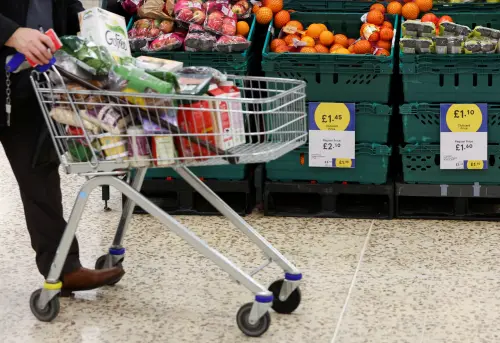British inflation slowed more than expected in February, providing some relief to consumers ahead of what is likely to be a new increase in price growth and easing the pressure on Finance Minister Rachel Reeves before her upcoming speech.
Consumer prices rose by 2.8% year-on-year in February, compared to January, as reported by the Office for National Statistics. Notably, clothing and footwear prices decreased for the first time in over three years. Economists had anticipated a 2.9% reading for February, while the Bank of England had forecasted a 2.8% increase in its early February projections.
The British pound fell by more than a third of a cent against the U.S. dollar. Two-year government bond yields, sensitive to speculations about Bank of England interest rates, dropped by almost seven basis points, marking their largest decline in nearly two months.
Economists warned that rising costs would soon push inflation back up. Suren Thiru, Economics Director at ICAEW, remarked that February's slowdown is a "false dawn" as significant near-term price rises are already expected. The anticipated increase in energy bills and national insurance could push inflation dangerously close to 4% in the near future. He noted that the Bank of England would remain cautious about price pressures, highlighting that any rate cuts would depend on the impact of April's substantial increase in business costs and measures from the Spring Statement.
Conversely, Luke Bartholomew, deputy chief economist at investment firm Aberdeen, indicated that the Bank of England would likely find some relief in the latest data. He stated that while the report does not fundamentally alter the inflation outlook, it clears the way for another interest rate cut in May.
The central bank expects consumer price inflation to peak at 3.75% in the third quarter of this year, nearly double its 2% target, primarily driven by higher energy costs and regulated tariffs for household utilities and bus fares. Last week, investors began to adjust their expectations regarding the pace of future borrowing cost reductions.
The Office for National Statistics also noted that services inflation, closely monitored by the Bank of England, remained at an annual rate of 5.0%, contrary to expectations for a decrease to 4.9%. The central bank had projected an increase to 5.1% for this data release.
James Smith, an economist at ING, described the services inflation data as a tentative indicator that the upcoming increase in employer taxes is influencing prices. He suggested that services inflation should still decline in the second quarter, keeping the Bank of England on track for three additional rate cuts this year.
